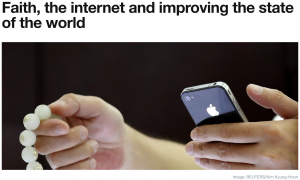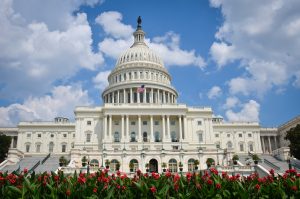 Updated: Nov. 30, 2017. Religious Freedom & Business Foundation President Brian Grim gave an address at the National Assembly of the Republic of Korea on November 29, 2017. Below is a transcript of his remarks describing how interfaith understanding and peace is facilitated through business and partnerships, supporting UN Sustainable Development Goal 16 (SDG 16). Grim spoke as part of a panel of local and international experts and policy makers at the start of the international STS&P conference to highlight and share appropriate technology tools and solutions to achieve the SDGs as part of Korea’s Overseas Development Aid (ODA).
Updated: Nov. 30, 2017. Religious Freedom & Business Foundation President Brian Grim gave an address at the National Assembly of the Republic of Korea on November 29, 2017. Below is a transcript of his remarks describing how interfaith understanding and peace is facilitated through business and partnerships, supporting UN Sustainable Development Goal 16 (SDG 16). Grim spoke as part of a panel of local and international experts and policy makers at the start of the international STS&P conference to highlight and share appropriate technology tools and solutions to achieve the SDGs as part of Korea’s Overseas Development Aid (ODA).
Peace and Sustainable Development in the 4th Industrial Revolution
- National Assembly, Republic of Korea
- Brian Grim’s Comments, November 29, 2017
Honorable Speaker of the Korean National Assembly, Mr. Chung Sye-Kyun, Honorable Assembly Members, Your Excellencies, Ladies & Gentlemen:
We live in an age when the global community is partnering to support sustainable development as embodied the 17 universally approved United Nations Sustainable Development Goals (SDGs).
Sustainable development means that there are multiple bottom lines when evaluating developmental success: financial, social and environmental. Sustainable development is characterized by giving everyone the opportunity to flourish, as companies, governments and civil society leaders put human needs and social well-being at the center of economic decision-making.
Businesses and corporations are stepping up to meet the challenge supported by the efforts of organizations such as the United Nations Global Compact and World Economic Forum. In partnership around the globe, they are working to reduce poverty, hunger, gender inequality, end pollution on land and sea. They are working to promote health, well-being, quality education, affordable and clean energy, decent work, and economic growth through industry, innovation and strengthened infrastructure.
However, the current context for these collaborative initiatives is radically different than it was even just a few decades ago due to the explosion in artificial intelligence (ai) capabilities, what the World Economic Forum calls the 4th Industrial Revolution. While ai can displace traditional jobs and disrupt economies, it also can bring tremendous benefits such as being able to identify and rescue people who are being victimized by human trafficking, which we discussed in a recent World Economic Forum meeting. Therefore, it is extremely important that we support and expand the efforts such as the STS&P conference being held here in Korea to highlight and share appropriate technology tools and solutions to achieve the SDGs without negative side effects.
 To give an example, technology can be used to spread falsehoods that divide people. But even more powerfully, technology can bring people together. Terrorists use the internet each day to recruit, but at the same time Pope Francis, with his 14.6 million Twitter followers, promotes peace day after day.
To give an example, technology can be used to spread falsehoods that divide people. But even more powerfully, technology can bring people together. Terrorists use the internet each day to recruit, but at the same time Pope Francis, with his 14.6 million Twitter followers, promotes peace day after day.
SDG 16 – promoting peace and better governance – is critical because without peace sustainable development is only a dream. And peace is in short supply on many countries. Data from the prestigious Pew Research Center show that the world is engulfed in a rising global tide of religious hostilities and restrictions. These range from actions of the so-called Islamic State in the Middle East to the oppression of Rohingyas in Myanmar to total State repression of freedom in North Korea.
And these restrictions and hostilities not only hurt the people involved, but threaten world peace, which is critical for sustainable development.
What can be done to roll back this dangerous tide? We would be wise to recognize and engage the power of the global and national business community, among others, as an ally.
Research from the Religious Freedom & Business Foundation, which I serve as president, shows that freedom of religion or belief is a powerful instrument of peace. Data show that freedom of religion or belief is strongly associated with economic growth, global competitiveness, including education, innovation, health and better lives for women and children.
So, how can and are businesses lowering hostilities and increasing peace? To answer this question, on March 8, 2018, in Seoul, South Korea, the day before the opening of the 2018 PyeongChang Paralympic Games, we will hold the second Global Business & Interfaith Peace Symposium and Awards (video below) sponsored by my foundation in collaboration with the United Nations Global Compact Business for Peace platform and the Global Compact Network Korea. The first symposium and awards were held at the start of the 2016 Paralympic Games in Rio de Janeiro.
Symposium participants and award recipients will have the opportunity to present their commitment to interfaith understanding and peace, while contributing to the UN Sustainable Development Goal (SDG) 16: “Promoting peaceful and inclusive societies for sustainable development, providing access to justice for all and building effective, accountable and inclusive institutions at all levels.”
I respectfully encourage the Korean government and Korean business community to more energetically engage in promotion of SDGs in general and, in particular, expand movements and projects aimed at building peace, justice and institutions that promote freedom and tolerance. There are many businesses in Korea already contributing through the Global Compact Network Korea, but more are needed to participate. Given the challenges Korea faces, your wonderful country has the opportunity to be the world leader in peace.







 Scholars and practitioners from across ASEAN countries and the world will gather in Hanoi, Vietnam, October 23-24 to discuss the connections between religion, law and the economy (topics at end).*
Scholars and practitioners from across ASEAN countries and the world will gather in Hanoi, Vietnam, October 23-24 to discuss the connections between religion, law and the economy (topics at end).*
 Keeping the Promise of Eradicating Human Trafficking
Keeping the Promise of Eradicating Human Trafficking Every year, thousands of people around the world are victims of human trafficking. Women and children are particularly affected, representing 70% of those whose most basic human rights are violated through this modern form of slavery.
Every year, thousands of people around the world are victims of human trafficking. Women and children are particularly affected, representing 70% of those whose most basic human rights are violated through this modern form of slavery. This year, the JRCLS Religious Liberty Day will feature two new religious liberty panel discussions starting at 4:00 p.m. and ending at 6:30 p.m. at the Mayflower Hotel on 5th Oct.
This year, the JRCLS Religious Liberty Day will feature two new religious liberty panel discussions starting at 4:00 p.m. and ending at 6:30 p.m. at the Mayflower Hotel on 5th Oct.


 By Theodore Roosevelt Malloch and Whitney MacMillan
By Theodore Roosevelt Malloch and Whitney MacMillan
